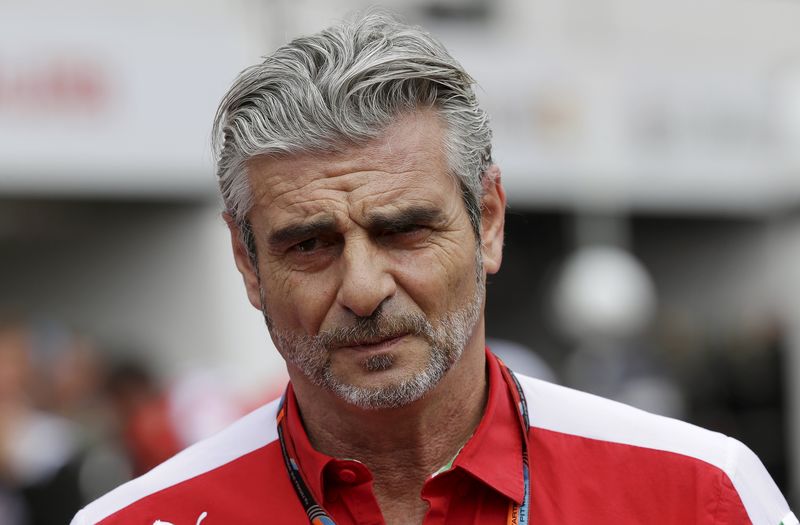By Alan Baldwin
MONTREAL (Reuters) - Cutting edge or chopping board? The current state of Formula One looks a lot like MasterChef to Ferrari team principal Maurizio Arrivabene.
The Italian, who last November became Ferrari's third principal in the space of a year, has called for a rules revolution to make the sport more relevant to modern audiences.
The proposals so far, put forward recently by the sport's Strategy Group, have been underwhelming if not without controversy.
"I want to use an example from MasterChef," Arrivabene told Reuters at the Canadian Grand Prix, in an interview ranging from the problems and entrenched positions in Formula One to his father's love of opera, when asked what could be done.
"You try to cook whatever you can cook with those ingredients and to do your best," he added, continuing the allusion to the popular television cookery show.
"I read articles after the Strategy Group that said this is not a revolution. They are going to find ideas from the past," he added. "But those are the ingredients that they put in front of us.
"This is most probably the reason why the novelty is not that big and is still keeping the old DNA. Until you have a new DNA, you can't cook something different."
Arrivabene, who joined Ferrari from a marketing background with primary sponsor Philip Morris, pointed to major North American sport as a possible recipe for success.
"You have NHL, NBA, NFL and you know the rules are very simple and adapted year after year to the show," he said. "Here it's the show that has to adapt to the rules. And I think this is wrong."
CONTROVERSIAL PROPOSALS
While teams argue about controversial proposals such as allowing teams like Ferrari to supply 'customer' cars to others -- a move independent teams such as Force India and Sauber are vehemently opposed to -- the Italian is doing his own bit to liven up the show.
Eddie Jordan, whose own eponymous team morphed into Force India, recently hailed Arrivabene as a kindred 'rock'n'roll' spirit.
The chain-smoking Ferrari boss, who came into the sport with a reputation as a hard man, has turned into something of a showman with a free-thinking approach and colorful use of imagery.
In Spain during a pre-season test he decamped to the stands to sit with the fans in a gesture also directed at the sport's commercial supremo Bernie Ecclestone for reducing the number of paddock passes available.
"I've known Eddie for a long time, he was a real rock'n'roll principal," smiled Arrivabene. "He was always himself, in and out of the paddock.
"What I am trying to do is more or less the same, to talk language that is not too academic and to be myself. I think it's ridiculous sometimes if a team principal is going to talk like an engineer.
"I think trying to be yourself is the best way. Most probably people think that I am a bit exaggerated with my expression but if Formula One wants to be popular, you have to use language without pretending to be what you want to be but are not."
Ecclestone, who has known Arrivabene for decades, recently acerbically described the Ferrari boss as a character 'only for himself and not for Formula One.'
"I don't want to comment on what Bernie said because somehow he's asking for more character and yet the other way he doesn't like more character. I don't know," said Arrivabene diplomatically.
CULTURAL INTEREST
What he did know was that MasterChef was something others should also pay attention to.
"The fact that somebody is a team principal doesn't mean that they are only looking at their own activity. They are living in the world and the world around us is MasterChef," said the 58-year-old.
"It's people who are struggling to go to the end of the month, it's movies, music, reading. A bit of cultural interest in what is surrounding you is something I would suggest to everybody.
"I find it extremely boring going out of the track and talking continually about Formula One because we show we are not living in the real world. This is a job and it's entertainment for the world, but the world is outside. It's not here."
Arrivabene said one particular image had stuck with him over the years to remind him of that.
He had been at the German Grand Prix at Hockenheim in the early 1990s at the height of the Bosnian war when shocking scenes of a child's suffering were broadcast on the television set in the team hospitality area.

"I turned my head and everyone was continuing as normal," he said. "They just looked for a while and continued to talk: 'Ah, do you remember the year of Piquet?'. And I thought are they living in the real world or what?"